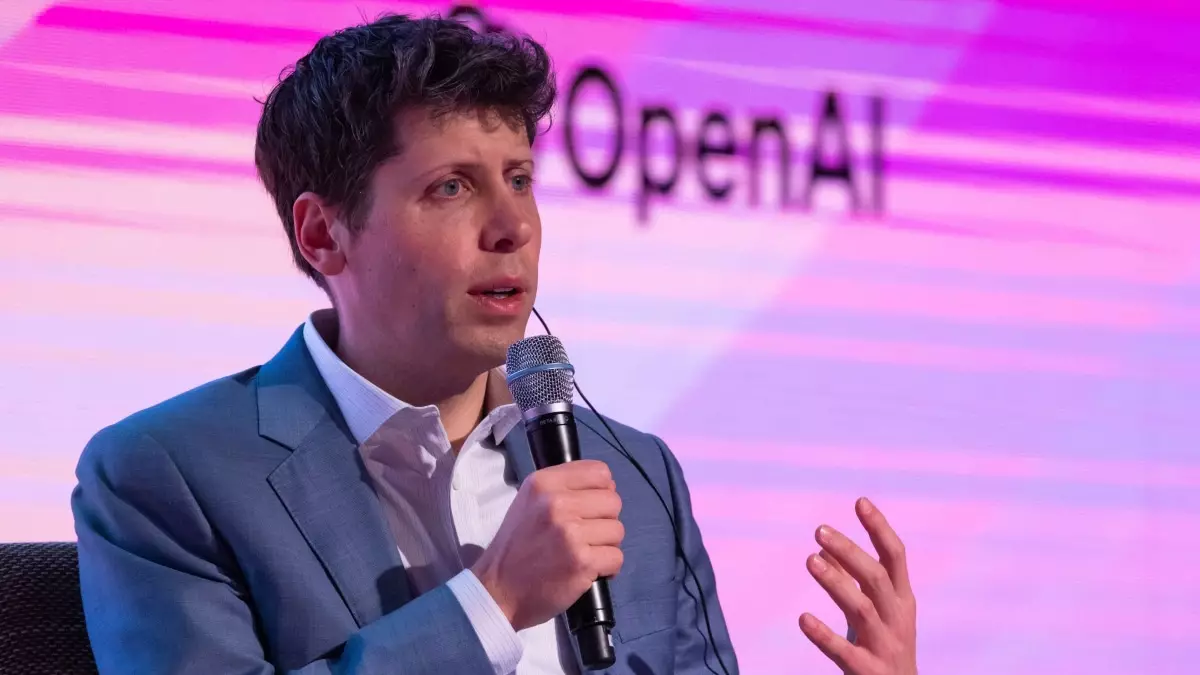In a rapidly evolving technological landscape where artificial intelligence (AI) holds the keys to an uncertain future, a courtroom showdown is brewing that could reshape the direction of one of the most influential companies in the sector. On March 16, a federal trial will commence surrounding Elon Musk’s lawsuit against Sam Altman and OpenAI, igniting a fierce rivalry that transcends simple business interests. It is a drama punctuated by ambition, resentment, and profound philosophical questions about artificial intelligence and its place in society.
The ruling by US District Judge Yvonne Gonzalez Rogers to expedite the trial shows a recognition of the urgency of the situation, as both parties are deeply entrenched in their positions. Musk contends that OpenAI has strayed from its altruistic founding principles by transitioning from a nonprofit organization to a for-profit business model, allegedly driven by profit motives over ethical considerations. This sentiment echoes a larger discourse surrounding the intention behind AI development — should innovation be driven purely by economic gain, or should there be a moral compass guiding these advancements?
An Ethical Quagmire
At the heart of Musk’s legal challenge lies a complex ethical dilemma. OpenAI was established in 2015 with the mission to ensure that cutting-edge AI technology benefits humanity as a whole. This ethos seems compromised as the enterprise shifts gears to attract massive investors like Microsoft, which Musk argues detracts from its founding goal of ethical AI development. On the other hand, it is essential to acknowledge that innovation often requires substantial financial backing, and OpenAI is seeking to navigate this precarious path to foster advancements in AI.
However, one must ask whether the pursuit of profitability may ultimately corrupt the core mission of OpenAI. Is profit the enemy of ethical innovation, or is it a necessary companion? It becomes increasingly critical for stakeholders, including policymakers and the general public, to intervene and lend their voices to the dialogue, ensuring that profit does not overshadow responsibility. As this case unfolds, it may serve as a litmus test for how society values ethical considerations versus financial incentives in one of the most transformative technologies of our time.
Musk’s Agenda: A Counter-Offensive?
Elon Musk’s motivations for launching this legal offensive are shrouded in ambiguity. Critics argue that his actions may be fueled more by a desire to weaken competition for his own AI project, xAI, rather than genuine concern for the ethical direction of OpenAI. Labeling Musk as a champion of ethics could prove problematic given his own track record of prioritizing business opportunities—take his handling of Twitter parent company X as a recent example. The insinuation that Musk’s legal challenge could be a strategic attempt to divert resources and goodwill from OpenAI in favor of his ambitions raises important questions about ulterior motives in high-stakes technological battles.
Yet, this complex web of interests reveals a more profound issue: the fragility of corporate governance and accountability in tech policymaking. As billionaire entrepreneurs navigate corporate landscapes, the need for checks and balances has never been more pressing. Musk and Altman may represent two sides of the same coin—both obsessed with pushing the boundaries of technology while operating within frameworks that often bend ethical considerations to accommodate financial gain.
The Bigger Picture: A Call for Accountability
In a world increasingly dominated by AI, the developments in this trial are not merely a clash of personalities; they reflect broader societal concerns about how technology should be regulated and who should wield its power. OpenAI’s valuation skyrocketing to $300 billion amidst these controversies underscores the potential for great wealth alongside the equivalent risk of misuse or unethical applications of technology. A ruling in favor of Musk might emphasize collective vigilance over free-market ambitions, while a ruling in favor of OpenAI could legitimize profit-driven motives as an acceptable part of technological advancement.
This courtroom battle is emblematic of a larger ideological struggle over the future of artificial intelligence. As societal stakeholders, individuals must demand greater transparency, accountability, and ethical integrity from those shaping the technologies that pervade our lives. The outcome of this trial could either reinforce the importance of ethical considerations in AI or signal the normalization of profit-oriented motives, leaving society to grapple with the consequences long after the courtroom doors have closed.

